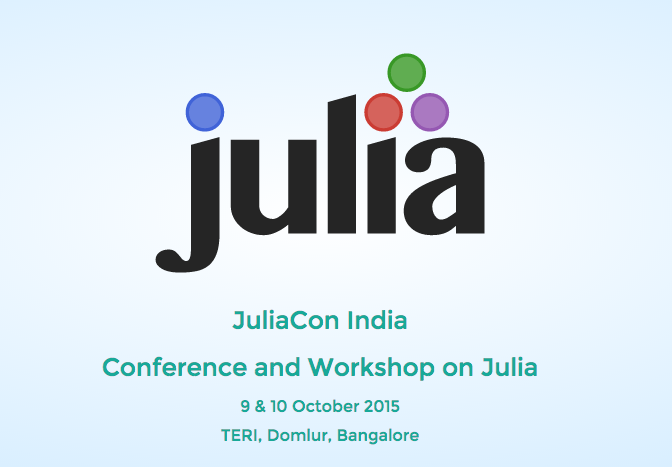First things first, we are really excited to announce our first JuliaCon India at Bangalore on Oct 9th and 10th. Julia Computing has partnered with Hasgeek for this event. For details and for registration, please visit http://www.juliacon.in/2015.
 Julia is the future of data science and analytics. Julia is open source, and its research and development have been anchored at MIT since 2009. Julia can easily be orders of magnitude faster than comparable solutions in interpreted dynamic languages such as R and Python, and is almost as fast as C (see http://julialang.org/benchmarks/). This makes it possible to deploy Julia in production.
Julia is the future of data science and analytics. Julia is open source, and its research and development have been anchored at MIT since 2009. Julia can easily be orders of magnitude faster than comparable solutions in interpreted dynamic languages such as R and Python, and is almost as fast as C (see http://julialang.org/benchmarks/). This makes it possible to deploy Julia in production.
Valentine’s day of 2012 was a special day for Julia. Our Why Julia blog post went viral and the Julia website has since been visited by over a million people. Today, Julia is a vibrant community with over 400 contributors. Over 700 packages are available in Julia today, in addition to the thousands of other open source packages in R and Python that can also be called from Julia.
Based on hundreds of discussions with CXO level leaders worldwide over the last 12 months or so, we now have deep insights into the nature of technical and business problems that enterprises are grappling with, and how Julia is already playing a key role in helping solve such problems.
Many companies depend on cutting edge computing technologies to create a market differentiator. Over the years, such companies would have developed in-house languages and/or databases or other technologies that they use to create their business solutions. Examples of such companies are large and small financial services firms on Wall Street, banks, investment banks, hedge funds and others who use such technologies in their trading platforms, asset management, risk management, portfolio management and other kinds of applications. Other examples of such firms are e-commerce companies that need pricing algorithms, search algorithms, and other compute intensive code that uses large amounts of data and complex algorithms. Such companies have either started looking at or started using Julia for their next generation platforms.
Similarly, CIOs’ offices in large enterprises in retail, distribution, telecom, manufacturing and many other verticals wrangle with high performance data analytics using their big data stacks. Julia is an ideal computational companion for such big data analytics applications.
CTOs’ organizations that undertake product design in engineering firms that are using tools in computer aided engineering, CAD, finite element analysis, computational fluid dynamics and other kinds of simulations are looking at Julia to replace the older mathematical computation packages that are slow, unwieldy and expensive. Examples of such organizations are found in automotive, aerospace, government labs, space research, and many others.
Regulators around the world are increasingly worrying about safety. Financial regulators want algorithms that are auditable and don’t crash markets. Regulators who keep our cars and planes safe and our environment clean are increasingly worried about the software that runs on these devices. Health regulators want devices that monitor our health to have reliable software. Regulators worldwide are now thinking about open source as the only viable approach to safety. Languages such as Julia that are mathematically sound and safe, make it easier for businesses to write software and for regulators to inspect it. We invite the reader to watch this fascinating video on the use of Julia in avionics.
In the nascent world of the Internet of Things, Julia provides a common language for analytics on the device and the server where algorithms can seamlessly and automatically move back and forth, given the constraints of bandwidth, power, and processing. Do see this video on the use of Julia in 3d printing.
Julia Computing, Inc. is a company formed by all the creators of Julia. Julia Computing provides professional development and deployment tools for Julia, consisting of open source as well as proprietary components. Our customers love having a common language for development and deployment of analytics solutions. Their gains are easily quantified by the elimination of program rewrites for deployment, and the significantly faster time to market.
Again, we are really excited to announce our first JuliaCon India at Bangalore on Oct 9th and 10th. Julia Computing has partnered with hasgeek for this event. For details and for registration, please visit http://www.juliacon.in/2015.
Guest Post by Viral Shah & Deepak Vinchhi for Julia Computing.

